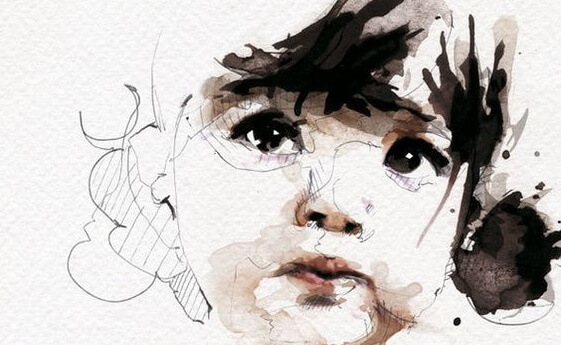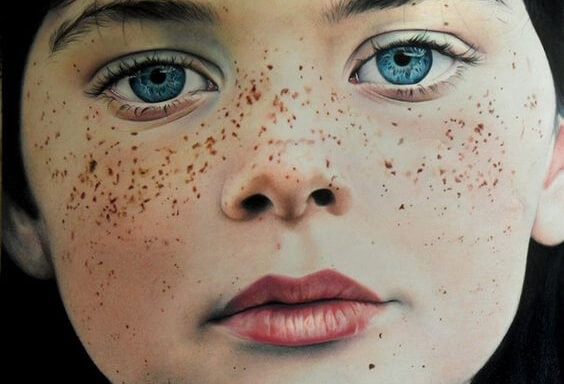My Child's Gaze Holds the Goodness of the World


Written and verified by the psychologist Valeria Sabater
Hope and kindness lie in every child’s gaze. The illusions and the always unruly curiosity inhabit the eyes of every small being… Let those noble inhabitants who live in their interior not get lost, but let those magical tenants always be in their heart accompanying them until maturity.
One question that has always been asked by psychologists, psychiatrists, sociologists, and philosophers is if children are born with a natural goodness. And it is society, nurture, and context that sometimes transform this original virtue into selfishness, lack of empathy, disregard for others or aggressive behavior.
“A gram of goodness is worth more than a kilo of intellect”
-Alejandro Jodorowsky-
Neuroscience explains that evil DNA exists in only 1% of cases. The rest, the reason why there are children, adolescents and adults who exhibit challenging and violent behaviors would undoubtedly be from the environment, a harmful parental bond, an educational situation, deep maltreatment or affective deprivation.
All this makes us think that, indeed, children come into this world with a natural goodness. However, more than goodness, specialists define it as “anxious to connect with their environment.”
A child needs everything from his parents, grandparents, family and all those who – with their attitude, treatment and adequate emotional intelligence – will undoubtedly enhance the child’s best qualities.
This task is undoubtedly worth investing time and effort.
Learn to enhance the natural goodness of your child

When your baby came into the world, something that certainly caught your attention quickly was their gaze. Later, when those eyes began to look at you voluntarily giving you even more than a smile, you discovered that few things can be more intense and more wonderful.
It is interesting to know that the eyes, beyond being the window of our heart and emotions, are also the way we usually make contact with others. Thus, the child who does not seek the face of their parents even though they have reached 2, 3, 4 years and the adult who dodges the eyes of his companion, usually present some type of underlying problem that needs to be identified.
People talk with our eyes, we look for ourselves and we need this channel to feel validated, to communicate affection, interest, to give attention and above all, love. Kindness dwells in those precious windows of your child, so do not hesitate, discover how you can enhance in them the value of the nobility, the empathy and that consideration that a baby naturally has within.
I will teach you to be aware of yourself
Before becoming aware of others and the emotions of others, a child must understand themselves. They need to understand what is right and what is not, where are the limits and why they sometimes feel anger, fear, frustration.
- They must understand that when they get angry, they should not hit others.
- They must feel free to cry when they need to, knowing that Mom will be there to comfort them.
- They must know that everything they do and say has an impact on others.
I will teach you to control your emotions
- One thing to keep in mind is that teaching a child to control their emotions does not mean just saying “do not scream”, “do not get angry”, “do not cry”.
- Instead of “no,” put a why: “why are you angry?”, “What is it that makes you cry?”
If we foster emotional communication in the child from an early age, we will facilitate greater competency in this area.
I will open the doors so that you know what social conscience is

Social consciousness is born in one’s own home, later extended to the world of school and little by little, opens up in other surroundings around the child.
It is in these progressive contexts that our children must demonstrate and apply their kindness, respect, consideration for others, their empathy and their ability to understand all those aspects that create strong bonds between people.
We will be their guides, we will be their best example and that enabler and daily enhancer that will allow the best of the child to shine!
“Kindness is the only investment that never fails “
-Henry David Thoreau-
Social Abilities
Social skills, such as good communication and assertiveness, will give the child the ability to establish and maintain healthy, respectful, and above all gratifying relationships.
- This is how they will learn, for example, how to defend themselves against bullies at schools, how they will serve as an example to others, how they will resolve conflicts and achieve strong and enriching friendships.
Fostering goodness in our children is a daily task in which it is necessary to invest effort, which we can never neglect. Let your child’s precious gaze always preserve that brightness of hope and goodness.
Hope and kindness lie in every child’s gaze. The illusions and the always unruly curiosity inhabit the eyes of every small being… Let those noble inhabitants who live in their interior not get lost, but let those magical tenants always be in their heart accompanying them until maturity.
One question that has always been asked by psychologists, psychiatrists, sociologists, and philosophers is if children are born with a natural goodness. And it is society, nurture, and context that sometimes transform this original virtue into selfishness, lack of empathy, disregard for others or aggressive behavior.
“A gram of goodness is worth more than a kilo of intellect”
-Alejandro Jodorowsky-
Neuroscience explains that evil DNA exists in only 1% of cases. The rest, the reason why there are children, adolescents and adults who exhibit challenging and violent behaviors would undoubtedly be from the environment, a harmful parental bond, an educational situation, deep maltreatment or affective deprivation.
All this makes us think that, indeed, children come into this world with a natural goodness. However, more than goodness, specialists define it as “anxious to connect with their environment.”
A child needs everything from his parents, grandparents, family and all those who – with their attitude, treatment and adequate emotional intelligence – will undoubtedly enhance the child’s best qualities.
This task is undoubtedly worth investing time and effort.
Learn to enhance the natural goodness of your child

When your baby came into the world, something that certainly caught your attention quickly was their gaze. Later, when those eyes began to look at you voluntarily giving you even more than a smile, you discovered that few things can be more intense and more wonderful.
It is interesting to know that the eyes, beyond being the window of our heart and emotions, are also the way we usually make contact with others. Thus, the child who does not seek the face of their parents even though they have reached 2, 3, 4 years and the adult who dodges the eyes of his companion, usually present some type of underlying problem that needs to be identified.
People talk with our eyes, we look for ourselves and we need this channel to feel validated, to communicate affection, interest, to give attention and above all, love. Kindness dwells in those precious windows of your child, so do not hesitate, discover how you can enhance in them the value of the nobility, the empathy and that consideration that a baby naturally has within.
I will teach you to be aware of yourself
Before becoming aware of others and the emotions of others, a child must understand themselves. They need to understand what is right and what is not, where are the limits and why they sometimes feel anger, fear, frustration.
- They must understand that when they get angry, they should not hit others.
- They must feel free to cry when they need to, knowing that Mom will be there to comfort them.
- They must know that everything they do and say has an impact on others.
I will teach you to control your emotions
- One thing to keep in mind is that teaching a child to control their emotions does not mean just saying “do not scream”, “do not get angry”, “do not cry”.
- Instead of “no,” put a why: “why are you angry?”, “What is it that makes you cry?”
If we foster emotional communication in the child from an early age, we will facilitate greater competency in this area.
I will open the doors so that you know what social conscience is

Social consciousness is born in one’s own home, later extended to the world of school and little by little, opens up in other surroundings around the child.
It is in these progressive contexts that our children must demonstrate and apply their kindness, respect, consideration for others, their empathy and their ability to understand all those aspects that create strong bonds between people.
We will be their guides, we will be their best example and that enabler and daily enhancer that will allow the best of the child to shine!
“Kindness is the only investment that never fails “
-Henry David Thoreau-
Social Abilities
Social skills, such as good communication and assertiveness, will give the child the ability to establish and maintain healthy, respectful, and above all gratifying relationships.
- This is how they will learn, for example, how to defend themselves against bullies at schools, how they will serve as an example to others, how they will resolve conflicts and achieve strong and enriching friendships.
Fostering goodness in our children is a daily task in which it is necessary to invest effort, which we can never neglect. Let your child’s precious gaze always preserve that brightness of hope and goodness.
All cited sources were thoroughly reviewed by our team to ensure their quality, reliability, currency, and validity. The bibliography of this article was considered reliable and of academic or scientific accuracy.
- Bowlby, J. (1986). Vínculos afectivos: formación, desarrollo y pérdida. Madrid: Morata.
- Bowlby, J. (1995). Teoría del apego. Lebovici, Weil-HalpernF.
- Garrido-Rojas, L. (2006). Apego, emoción y regulación emocional. Implicaciones para la salud. Revista latinoamericana de psicología, 38(3), 493-507. https://www.redalyc.org/pdf/805/80538304.pdf
- Marrone, M., Diamond, N., Juri, L., & Bleichmar, H. (2001). La teoría del apego: un enfoque actual. Madrid: Psimática.
- Moneta, M. (2003). El Apego. Aspectos clínicos y psicobiológicos de la díada madre-hijo. Santiago: Cuatro Vientos.
This text is provided for informational purposes only and does not replace consultation with a professional. If in doubt, consult your specialist.








